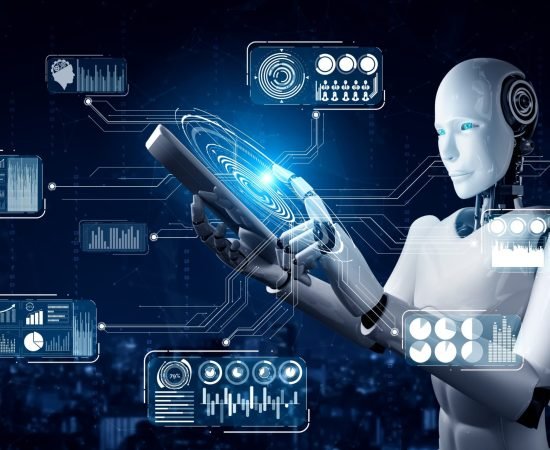AI (Artificial Intelligence) and machine learning are two closely related fields that have gained significant attention and transformed various industries in recent years. Here’s an overview of AI and machine learning and their applications:
Artificial Intelligence (AI):
AI refers to the development of computer systems capable of performing tasks that would typically require human intelligence.
It involves simulating human intelligence in machines, enabling them to perceive, reason, learn, and make decisions.
Machine Learning (ML):
Machine learning is a subset of AI that focuses on the development of algorithms and models that enable computers to learn and make predictions or decisions based on data.
ML algorithms learn from data patterns, identify trends, and make predictions without being explicitly programmed.
Applications of AI and Machine Learning:
Natural Language Processing (NLP): AI-powered NLP techniques enable computers to understand, interpret, and generate human language. Examples include virtual assistants, chatbots, and language translation tools.
Computer Vision: AI and ML are used in computer vision to enable machines to understand and interpret visual information. Applications include facial recognition, object detection, and autonomous vehicles.
Recommender Systems: Many online platforms use ML algorithms to analyze user preferences and provide personalized recommendations, such as in e-commerce, streaming services, and social media.
Fraud Detection: AI and ML algorithms are employed to detect fraudulent activities by analyzing patterns and anomalies in large datasets, improving security in financial transactions and online platforms.
Healthcare: AI and ML technologies are used in medical diagnostics, disease prediction, drug discovery, and personalized medicine, aiding in early detection and improving patient outcomes.
Autonomous Systems: AI and ML are crucial in developing autonomous systems like self-driving cars, drones, and robots that can navigate, make decisions, and interact with the environment.
Financial Analysis: AI and ML algorithms can analyze financial data, predict market trends, assess investment risks, and automate trading processes.
Customer Service: AI-powered chatbots and virtual assistants help automate customer service interactions, answering queries, providing support, and improving overall customer experience.
Ethical Considerations:
As AI and machine learning continue to advance, ethical considerations become increasingly important. Issues such as bias in algorithms, privacy concerns, and the impact of automation on jobs and society need to be carefully addressed.
Future Developments:
AI and machine learning are rapidly evolving fields with ongoing research and advancements. Areas such as explainable AI, reinforcement learning, and deep learning are driving further innovation and practical applications.
AI and machine learning have the potential to revolutionize various industries, enhance decision-making processes, and bring about significant societal impacts. However, it’s important to approach their development and deployment responsibly, ensuring transparency, fairness, and ethical considerations are given due attention.




